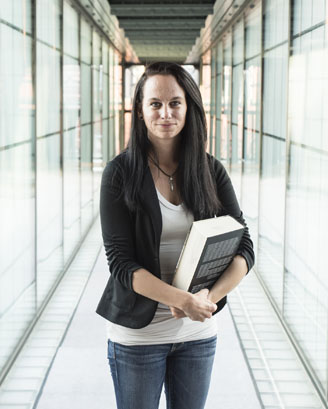
Laura Mahan's research at the Holocaust Museum uncovered little-known facts about gender-specific violence in German concentration camps. Photo by Ron Aira.
A study by George Mason University master’s student Laura Mahan sheds light on a silent aspect of the Holocaust: gender-specific and sexual violence.
Exploring rarely seen documents at the archives of the Holocaust Memorial Museum in Washington, D.C., located just a few miles from George Mason’s School for Conflict Analysis and Resolution, Mahan uncovered important information as to the treatment of women in Europe’s concentration camps.
Working with Professor Douglas Irvin-Erickson, Mahan decided to look for archival evidence at the museum that depicted violence against women during the Holocaust.
“I thought about it and realized that in all my research that I had done on past genocides, I had never come across an article or journal talking about violence against women during the Holocaust, nor did I know much about it. So I felt it was the right topic to explore,” she said.
Her multilayered study “is basically about how gender-specific violence and sexual vulnerability contributed to Jewish women’s denigration during the Holocaust. But also, how gender-specific violence and sexual vulnerability needs to be acknowledged for what it is—a crime against humanity.
“The victims must be seen for who they are—human beings who suffered insurmountable violence at the hands of Nazis, and each one of their stories must be heard, analyzed and embraced as an important aspect of the Holocaust experience, regardless of gender.”
One of her biggest surprises in doing the research at the archives was just how widespread rape and abuse was during the Holocaust.
Irvin-Erickson said Mahan’s research touches new territory in the history of the Holocaust.
“Over the last decade, scholars have been paying increasing attention to the gendered dynamics of the Holocaust,” he said. “They’re trying to make sure that these forms of gender-based violence are recognized as a part of the continuum of violence and oppression that people experienced.
“Laura's work builds on this scholarship, using the narratives of Holocaust survivors to help tell this story.”
Manhan hopes to improve understanding of Holocaust victims through her research.
“Once this narrative is broken and the silence surrounding the intimate atrocities that women faced is brought to light, we will finally, as a whole, understand deeper aspects of the violence perpetrated during the Holocaust,” she said.
